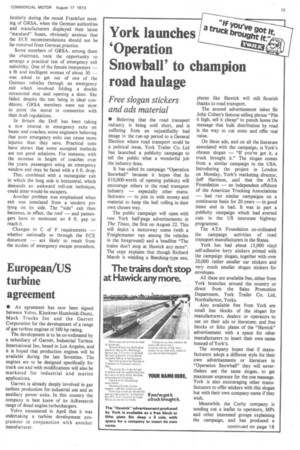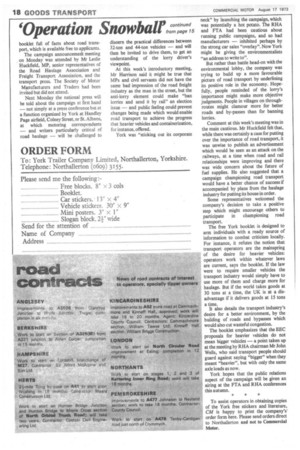York launches 'Operation Snowball' to champion road haulage
Page 17

Page 20

If you've noticed an error in this article please click here to report it so we can fix it.
Free slogan stickers and ads material
• Believing that the road transport industry is being sold short, and is suffering from an unjustifiably bad image in the run-up period to a General Election where road transport could be a political issue, York Trailer Co. Ltd has launched a publicity campaign to tell the public what a wonderful job the industry does.
It has called its campaign "Operation Snowball" because it hopes that its £10,000-worth of opening publicity will encourage others in the road transport industry — especially other manufacturers — to join in with money and material to keep the ball rolling in their own chosen way.
The public campaign will open with two York half-page advertisements in The Times, the first on August 22. This will depict • a motorway scene (with a Freightmaster van among the vehicles in the foreground) and a headline "The trains don't stop at Hawick any more". The copy explains that though Richard Marsh is wielding a Beeching-type axe,
places like Hawick will still flourish thanks to road transport.
The second advertisement takes Sir John Cohen's famous selling phrase "Pile it high, sell it cheap" to punch home the message that bulk distribution by road is the way to cut costs and offer real value.
On these ads, and on all the literature associated with the campaign, is York's chosen slogan — "If you've got it, a truck brought it." The slogan comes from a similar campaign in the USA. Introducing the project in London on Monday, York's marketing director, Jeff Harrison, said that the ATA 'Foundation — an independent offshoot of the American Trucking Associations — had run similar campaigns on a continuous basis for 20 years — in good times and in bad. It was in part a publicity campaign. which had averted cuts in the US interstate highway programme.
The ATA Foundation co-ordinated the campaign activities of road transport manufacturers in the States.
York has had about 15,000 vinyl self-adhesive lorry stickers printed with the campaign slogan, together with over 20,000 rather smaller car stickers and very much smaller slogan stickers for envelopes.
All these are available free, either from York branches around the country or direct from the Sales Promotion Department, York Trailer Co. Ltd, Northallerton, Yorks.
Also available free from York are small line blocks of the slogan for manufacturers, dealers or operators to use on their ads or literature; and free blocks or litho plates of the "Hawick" advertisement with a space for other manufacturers to insert their own name instead of York's.
The company hopes that if manufacturers adopt a different style for their own advertisements or literature in "Operation Snowball" they will nevertheless use the same slogan, to get maximum exposure for the one message. York is also encouraging other manufacturers to offer stickers with this slogan but with their own company name if they wish.
Meanwhile the Corby company is sending out a leaflet to operators, MPs and other interested groups explaining the campaign, and has produced a booklet full of facts about road transport, which is available free to applicants. The campaign announcement meeting on Monday was attended by Mr Leslie Huckfield, MP, senior representatives of the Road Haulage Association and Freight Transport Association, and the transport press. The Society of Motor Manufacturers and Traders had been invited but did not attend.
Next Monday the national press will be told about the campaign at first hand — not simply at a press conference but at a function organized by York at Handley Page airfield, Colney Street, nr St. Albans, at which motoring correspondents — and writers particularly critical of road haulage — will be challenged to discern the practical differences between 32-ton and 44-ton vehicles — and will then be invited to drive them, to get an understanding of the lorry driver's viewpoint.
At this week's introductory meeting, Mr Harrison said it might be true that MPs and civil servants did not have the same bad impression of the road freight industry as the man in the street, but the anti-lorry element could make "ban lorries and send it by rail" an election issue — and public feeling could prevent changes being made which would enable road transport to achieve the progress that heavier vehicles and containerization, for instance, offered.
York was "sticking out its corporate neck" by launching the campaign, which was potentially a hot potato. The RHA and FTA had been cautious about running public campaigns, and so had manufacturers — inhibited perhaps by the strong car sales "overlay". Now York might be giving the environmentalists "an address to write to".
But rather than battle head-on with the environmental lobby, the company was trying to build up a more favourable picture of road transport by underlining its positive role in the economy. Hopefully, people reminded of the lorry's importance might make more objective judgments. People in villages on throughroutes might clamour more for better roads and by-passes than for banning lorries.
Comment at this week's meeting was in the main cautious. Mr Huckfield felt that, while there was certainly a case for putting over the importance of road transport, it was unwise to publish an advertisement which would be seen as an attack on the railways, at a time when road and rail relationships were improving and there was wide concern about the future of fuel supplies. He also suggested that a campaign championing road transport would have a better chance of success if accompanied by plans from the haulage industry for putting its house in order.
Some representatives welcomed the company's decision to take a positive step which might encourage others to participate in championing road transport.
The free York booklet is designed to arm individuals with a ready source of information to combat criticism locally. For instance, it refutes the notion that transport operators are the mainspring of the desire for heavier vehicles: operators work within whatever laws are current, says the booklet. If the law were to require smaller vehicles the transport industry would simply have to use more of them and charge more for haulage. But if the world takes goods at 30 tons at a time, the UK is at a disadvantage if it delivers goods at 15 tons a time.
It also details the transport industry's desire for a better environment, by the building of roads and bypasses which would also cut wasteful congestion.
The booklet emphasizes that the EEC proposals for heavier vehicles do not mean bigger vehicles — a point taken up at the meeting by RHA chairman Mr John Wells, who said transport people should guard against saying "bigger" when they meant "heavier", but with only the same axle loads as now.
York hopes that the public relations aspect of the campaign will be given an airing at the FTA and RHA conferences this autumn.
































































































